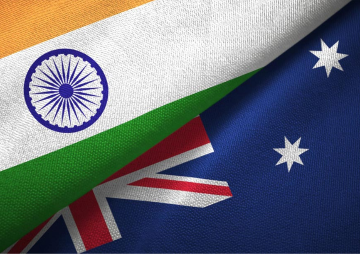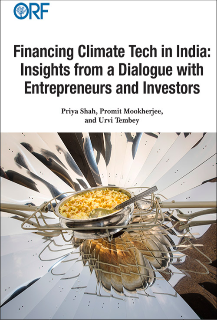Should India join the international coalition against the ISIS or Daesh? This topic was debated hotly during a discussion on the book “Modi and the World: The Ring View Insideout” at Observer Research Foundation, Delhi
Participating in the discussion, Mr. M.D Nalapat, academic, editor and author, differentiated the threat of ISIS (Daesh) from the ones we faced from Al-Qaeda or Taliban because of the ideology involved. Taliban was a Pashtun centric group while Al-Qaeda was closer to Wahabbism. ISIS on the other hand has influenced people who have little dependence on theology and have managed to attract those who were simply drawn to the idea of violence. This makes them a more dangerous prospect because of how relatively easily they can radicalise individuals. Mr Nalapat argued that it is only a matter of time that someone influenced by ISIS ideology attempts to pull off a major attack. He argued that the potential blowback to tough action is less than the potential blowback from a softer policy. He added that he does not condone military interventions, but in the case of a master terror attack (in India), military support might be necessary in order to raise the bar for the consequences to launch attacks.
Mr Ranjit Gupta, former Indian ambassador, offered a different view from that of Mr. Nalapat’s. He pointed out that China and Pakistan too have kept out of the coalition. Pakistan did so because of risk of further alienating a significant section of the army who are already radical in many ways. China stayed out because of the risk of blowback coming from the Chinese Muslims in the northern regions. He further argued that the secular social fabric of India has prevented ISIS from having any lasting influence on Indian Sunni Muslims and this could be maintained by upholding secularism in a way which does not allow the pre-eminence of any religion. Mr Gupta noted that the Syrian quagmire is wreaking havoc in the region and its geopolitics and India’s involvement would lead to problems with other West Asia powers who see India as an ally and maintain excellent relationships. He felt that Daesh will resort to indiscriminate attacks against nations who are a part of the coalition and there is no pressing need for India to get involved and put a target on its back. He too believed that Pakistan and China did not join the coalition because of the risk of blowback from such a decision. He added that Pakistan had enough problems on its plate when it came to terrorism to invite further trouble.
Mr. Kanchan Gupta, noted journalist and writer, however, disagreed with the views expressed Mr Gupta. He argued that major attacks today come from lone wolves and radicalisation may not need sympathies or support of many within the community and even a few radicalised can carry out major attacks. He remarked that there is an increase in the radicalisation in Kerala, western Uttar Pradesh and even Goa, and this is not something the government should ignore.
According to him, the South Block often misjudges and underestimates the threat of radicalisation and amendments must be made to this kind of approach. He said in terms of foreign policy, India need to be more forceful. He said our own terrorism concerns won’t be taken seriously if India sees international terrorism as someone else’s war. Such an approach does not always put us in the good books of other nations. Israelis think of India as “Charlatans” and having a non-aligned policy may not be the best approach in the 21st century, he said.
As an example of consequences to non-alignment, Mr Kanchan Gupta pointed to the increase in terror attacks in Turkey as a result of Turkish strategic ambivalence towards dealing with Daesh. Similarly, India’s non-aligned stance and aversion to committing to international coalitions or action might backfire on India at some point, according to him.
Earlier, co-author of the book, Ms. Yamini Chowdhury, introduced the book by talking about how it serves as a possible handbook for someone seeking to understand the Modi government’s foreign policy approach in its first two years. In order to cover different perspectives, the book contains views and opinions of authors from the fields of academia, politics, diplomacy and business. She said the book was not attempting to explain the Modi government doctrine in regards to foreign policy as it was too early to make such a claim. Nonetheless, it did a good job of putting forward the policy approach and objectives.
The discussion was moderated by Mr. Pinak Ranjan Chakravarty, former Secretary in the Ministry of External Affairs. He said the Modi government has a good opportunity to re-align its foreign policy with its majority mandate. He reflected on the major challenges that India faced in regards to integration of South Asia with Pakistan and dealing with an increasingly muscular China. According to him, a bigger concern might be that Pakistan backed terrorists attacking India under the Daesh banner, thus hiding the Pakistani hand.
He emphasised the need for pre-emptive and preventive measures to deal with radicalisation and terror. He gave the example of some agents in the Indian establishment tracking down radicalised kids and telling their parents about it to get them to rein them in. He noted that such creative pre-emptive measures should be utilised more often.
This report is prepared by Abhilash Prasann, Research Intern, Observer Research Foundation, Delhi
The views expressed above belong to the author(s). ORF research and analyses now available on Telegram! Click here to access our curated content — blogs, longforms and interviews.




 PREV
PREV

